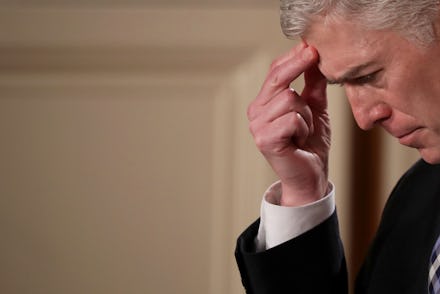Judge Neil Gorsuch would be a disaster for women's rights on the Supreme Court

On Tuesday, the Republican Party reaped the fruits of its unprecedented Supreme Court blockade. President Donald Trump announced the nomination of Judge Neil Gorsuch, a 49-year-old arch-conservative currently serving on the 10th Circuit Court of Appeals. Trump may have been the people’s second choice in the popular vote, but he will still have succeeded in putting a young, doctrinaire conservative on the Supreme Court.
Like the justice he will be replacing, Antonin Scalia, Gorsuch is an adherent of “originalism” and “textualism” as touchstones for his interpretation of the Constitution. As Scalia’s own jurisprudence reveals, however, these phrases amount to just another way of saying “conservative.”
Asked about another buzzword that was popular in the 1970s and 1980s, the late conservative Chief Justice William Rehnquist said that “a strict constructionist judge is one who favors criminal prosecutors over criminal defendants, and civil rights defendants over civil rights plaintiffs.” Substitute “originalist” or “textualist” for “strict constructionist” and his analysis still applies.
Given these views and his general conservative orientation, it would be a major surprise for the right if Gorsuch ever voted to strike down even the most draconian regulation of abortion. He is highly likely to be the fifth vote to overrule Roe v. Wade if he gets the opportunity.
In short, Gorsuch’s confirmation would be very bad news for American women.
Let's start with reproductive freedom. The news is not good. Gorsuch has been extremely hostile to Planned Parenthood. He believes that employers should be given broad exemptions to use their religious beliefs to deny contraceptive coverage to their employees. In a particularly radical example, he joined an opinion arguing that it was “clearly and gravely wrong” for the 10th Circuit to find that it was not a “substantial burden” for religious employers to fill out a form exempting them from providing contraceptive coverage.
Gorsuch’s nomination will not immediately shift the ideological direction of the Court.
While these views are dismaying, because Anthony Kennedy — who voted to uphold Roe, albeit in an narrower form — remains the median vote of the Court, Gorsuch’s nomination will not immediately shift the direction of the Court. In many other policy areas, however, he will.
Gorusch will, first of all, be a disaster for the rights of consumers and employees. As Senator Elizabeth Warren said when declaring her opposition to Gorsuch’s nomination, “He has twisted himself into a pretzel to make sure the rules favor giant companies over workers and individual Americans. He has sided with employers who deny wages, improperly fire workers or retaliate against whistleblowers for misconduct. He has ruled against workers in all manner of discrimination cases.” Since Kennedy also has consistently conservative views on this issue, Trump’s first appointment will have an immediate impact in these areas.
Gorsuch has also suggested that the courts should become much less deferential to federal agencies. In practice, this would have the effect of hobbling the federal regulatory state, making Gorsuch an ally of Trump’s cabinet, whose appointees also want federal agencies to function less effectively. His votes will also make it harder for the next Democratic president to effectively regulate the environment. Furthermore, he is likely to vote against most civil liberties claims as well, although like Scalia he sometimes has a libertarian streak. For example, he once held that police officers were not entitled to “qualified immunity” from being sued when they arrested students in the seventh grade for making burping noises. If there’s any silver lining to his nomination, it’s that he may be more likely to side with liberals on Fourth Amendment issues than Justice Samuel Alito.
One final concern is with voting rights. Gorsuch does not have a track record on this issue. But given the strong consensus in favor of voter suppression within the Republican Party, it’s likely that he will not stop states from making it more difficult to vote, even when measures are clearly targeted at minority voters. Certainly, Democratic senators need to press him on this issue in confirmation hearings.
The problem with "originalism"
Originalism is the theory that ambiguous constitutional provisions should be interpreted based on how they were understood at the time they were ratified. But for a variety of reasons, the original understanding does little to constrain judges. Judges are not competent historians, and even if they were, the historical record is often unclear — particularly where broad constitutional provisions are concerned.
Even in the rare cases where the historical evidence is unambiguous, “originalist” judges will not be constrained by it if it conflicts with strong political commitments. It is indisputable that when the Fourteenth Amendment was ratified in 1868, it was not understood as prohibiting racial classifications. And yet, Justice Clarence Thomas and the late Justice Scalia — the Court’s two professed originalists — have held that the Fourteenth Amendment forbids federal affirmative-action programs.
“Textualism” has even less value as applied to constitutional interpretation. Simply invoking the text tells us nothing useful about how to apply broad phrases like “unreasonable search and seizure” or “cruel and unusual punishment” to cases of any interest. And, again, even in those rare cases where the constitutional text seemed to settle a constitutional dispute, Scalia would happily ignore it if it conflicted with his political views.
In short, Gorsuch is a very conservative judge, and he will consistently vote to undermine women's rights, employees' rights, civil rights, civil liberties defendants and the power of the federal government to regulate the economy. Democrats should filibuster his nomination, and they probably will.